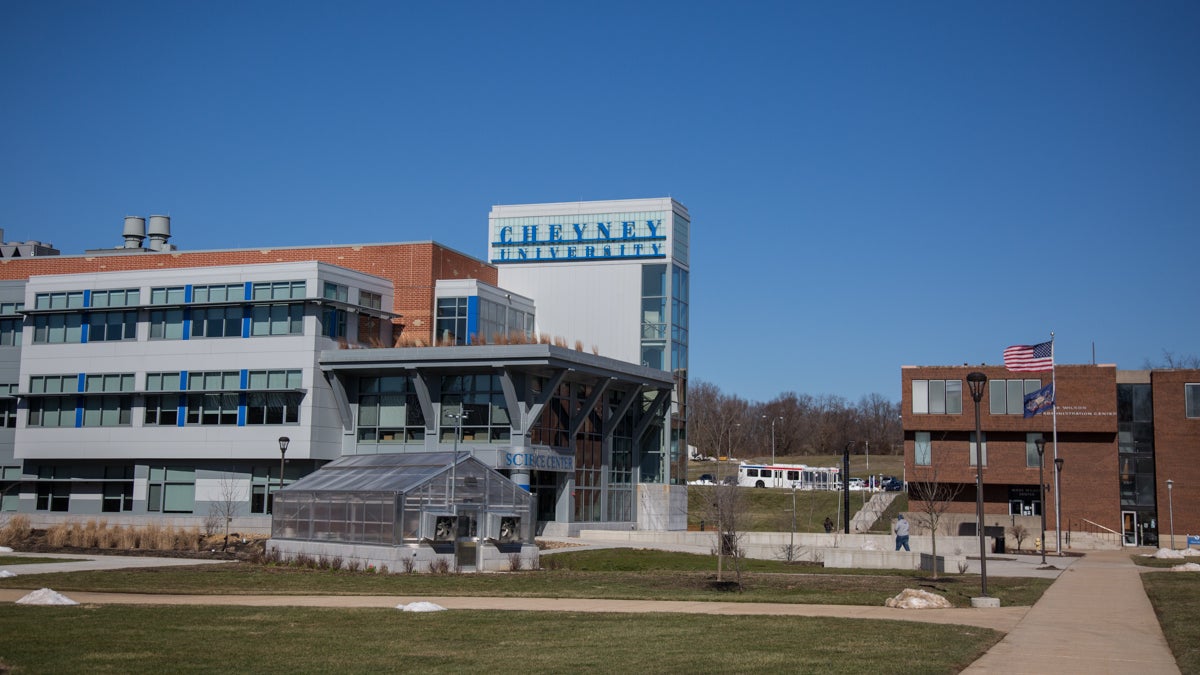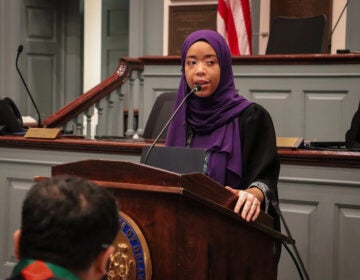Cheyney University defending its accreditation, gets conditional loan forgiveness
Listen
Cheyney University (Emily Cohen for WHYY)
Cheyney University of Pennsylvania faces a deadline next week to prove why it should keep its accreditation. Without it, the nation’s oldest historically black university would have to shut.
Cheyney must submit a report — including a balanced budget — to the accrediting Middle States Commission on Higher Education by Friday, Sept. 1, and then an on-campus evaluation will follow.
To help Cheyney get its finances in better shape, the Board of Governors of the Pennsylvania State System of Higher Education — which oversees Cheyney and 13 other universities — announced this week that it will forgive more than $30 million in loans.
“This level of support from the Board and the system universities is unprecedented in the effort to help Cheyney survive and thrive so that it can serve students — currently and in the years to come,” said Board Chair Cynthia D. Shapira in a statement.
Cheyney’s accreditation has been on probation since 2015.
At a special board meeting in Harrisburg Tuesday, the board approved the measure to waive the Cheyney’s repayment of loans if Cheyney demonstrates certain benchmarks.
One-third will be forgiven when Cheyney cuts $7.5 million from its current budget and maintains a balanced budget next year.
The next two-thirds will be forgiven if the university keeps a balanced budget the following two fiscal years.
“Cheyney University has an important role in our system, and this system has stepped up — in a big way — to prove that,” said Chancellor Frank T. Brogan in a statement.
Ken Mash, president of the state system’s faculty union, said Cheyney has to be solvent to remain accredited but its main purpose is to educate an underserved population.
“There’s a lot of people talking about, ‘Saving Cheyney, Saving Cheyney,’ and indeed Cheyney needs to be saved, but it doesn’t need to be saved as a monument to a segregationist past,” he said. “It needs to be saved because there are students out there who need Cheyney University, who would not otherwise go to college if it were not for Cheyney University.”
He said getting the lines of credit forgiven was crucial, but wants to see long-term steps as well.
“I don’t want to take away from the fact that this step was absolutely necessary,” Mash said. “But there has to be a plan out there to improve it and make it better and make it a fully functioning university.”
Professor Ivan Turnipseed, chair of the hospitality and recreation management department, said the loan forgiveness is a game changer but is concerned about more cuts.
“We have to cut all that can be cut, but again, we have to have enough infrastructure and the heart to sustain our institution for the future,” he said. “Cutting $7.5 million from an already routinely under resourced institution is of great concern to me.”
The institution has already made two rounds of administration and staff cuts.
Turnipseed said he’s been committed as a department chair and faculty member to help Cheyney maintain its accreditation but has also been vocal that unless someone contributed millions of dollars, he didn’t see how the school would have a chance to keep its accreditation.
“This hopefully changes the situation substantively and significantly,” he said of the loan forgiveness.
To help balance the budget, the school also will consider placing some of its 18 academic programs into moratorium — meaning they won’t accept any new students.
University officials say it’s too early to know which programs would be affected.
“The easy decisions were made years ago; all we have left are the tough choices,” said Cheyney interim president Aaron Walton in a statement. “At the end of the day, we would rather see some programs be discontinued if it means preserving the university for generations to come.”
Faculty members affected by discontinued programs would be notified by October 30. But affected faculty would teach through the spring semester and have preferential hiring rights to vacancies at Cheyney and the other 13 state system universities.
Currently, students enrolled in a program that has been put into moratorium can continue until they graduate, but Cheyney is unable to maintain a balanced budget under that policy.
The board approved an exemption to allow existing students in a discontinued program to complete either another program at Cheyney or transfer to a similar program at another state college or possibly Lincoln University, Pennsylvania’s other historically black university, in Chester County.
Junior Meghan Sowersby, from Delaware County, said students who have to switch schools could get derailed.
“Often what seems to be a viable option on paper is actually really hard to execute on the ground,” she said. “It will be hard for students who may not be full-time students — part-time students, non-traditional students, commuting students, that kind of thing. That makes it a lot more difficult for them.”
The communications major said it’s essential the state system help out Cheyney.
“As a state school, I think that it’s important that PASSHE does lend out these olive branches to help Cheyney get out of this financial situation.”
The 20-year-old said she understands the loan forgiveness comes with stipulations, like trimming its budget, but hopes that doesn’t affect the school’s quality of education.
“I’m always hopeful for the future,” Sowersby said.
WHYY is your source for fact-based, in-depth journalism and information. As a nonprofit organization, we rely on financial support from readers like you. Please give today.




